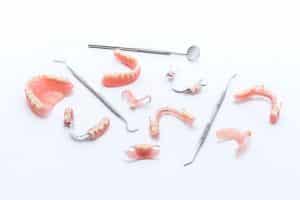 For those that have lost more than one tooth, everything from eating to speaking can become problematic. In order to restore health and function, you need a prosthetic. We may recommend a denture, such as a full or partial. What type of denture does your smile need? How do they differ from one another?
For those that have lost more than one tooth, everything from eating to speaking can become problematic. In order to restore health and function, you need a prosthetic. We may recommend a denture, such as a full or partial. What type of denture does your smile need? How do they differ from one another?
Try Our Quiz on Dentures
- True or False: Tooth loss can lead to major complications.
- True or False: Partials address advanced tooth loss.
- True or False: Full dentures replace all missing teeth.
- True or False: We can secure them with dental implants.
Answer Key
- True. Common complications of tooth loss include misalignment, TMJ disorder, bruxism, and an increased risk of tooth decay/gum disease (due to misalignment). In addition, the loss of jawbone tissue due to the body suspending the flow of calcium and phosphorus to the jaw can cause an aged appearance as a result of facial collapse.
- True. Often, we lose multiple teeth spread out across the arch. In these cases, you need a prosthetic. A partial denture can replace lost teeth, even if they are spread apart. The prosthetic contains metal clasps that attach to the remaining natural teeth, anchoring the new ones securely in place.
- True. A full denture contains a base made from acrylic that mimics the appearance of natural gum tissue. The base holds a full set of replacement teeth. Natural suction will hold the new teeth in place. You may also benefit from the use of special adhesive.
- True. Instead of relying on suction, we can place multiple dental implants to secure a fixed denture. The prosthetic won’t slip and can last longer than removable dentures. In addition, the implants can prevent the further loss of jawbone tissue.


